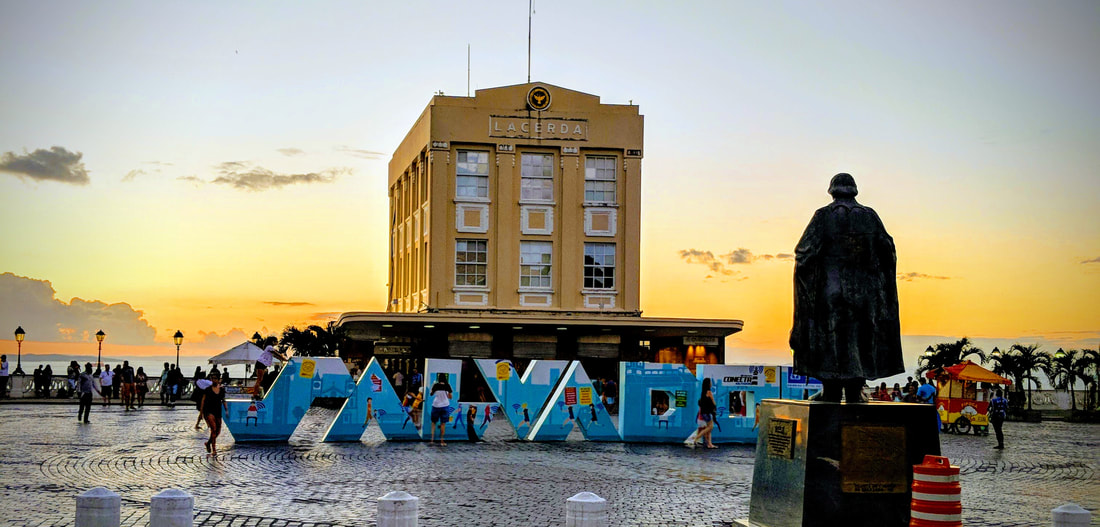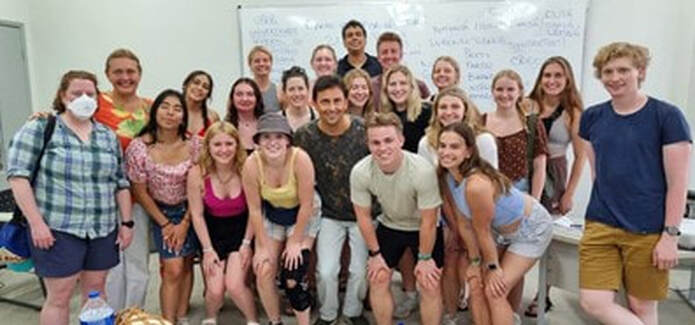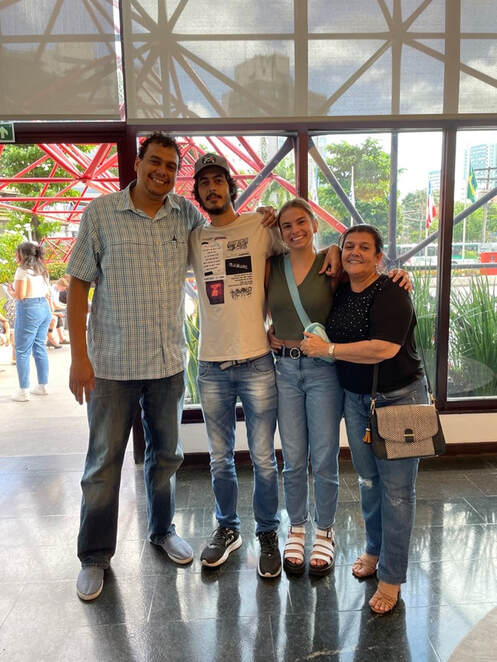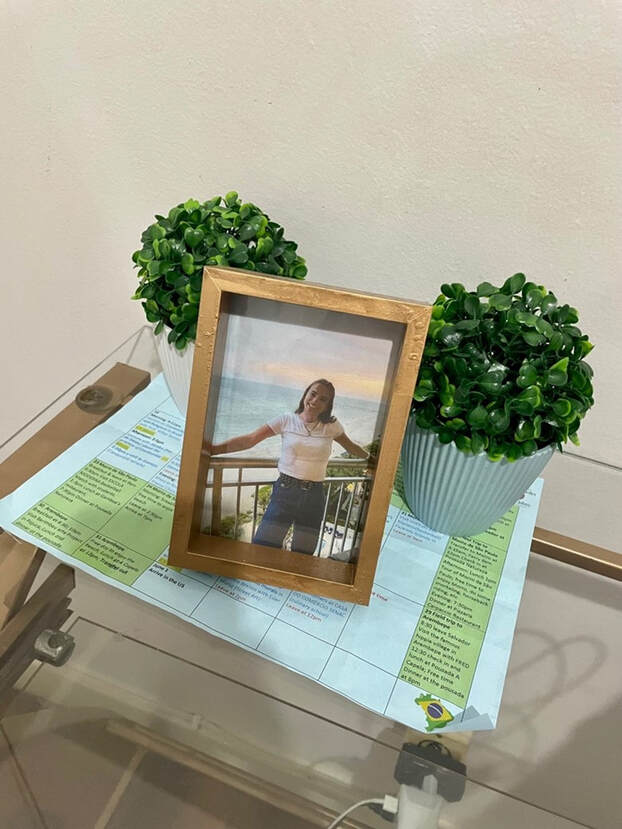|
By Lily Fredericks If you read my last blog post, you know that I was pushing myself to be open to new experiences and interactions, and I am proud to say that I have done this. I also mentioned that I wanted to continue to do this throughout the rest of my time in Brazil. The story I am about to tell definitely demonstrates this, and it lead to an interaction that I never expected, but that I learned a lot from. One night, I was sitting on the balcony of our apartment with my host mom, her grandson Pedro, and my host mom’s son who was visiting. The topic of conversation ranged widely – from sports, to beer, to school. I began talking with Pedro about his experience with Brazil’s education system, and his lived experience confirmed what I have learned thus far, which was cool to hear. He said that the higher education system is unfair in many ways and that it is not accessible for racial minorities. At the Steve Biko Institute, I learned that many black folks come from public high schools which are much worse due to racist societal dynamics and lower income levels, but then the white folks take up the spots at the excellent free public colleges. In 2002, colleges started reserving spots for black folks, but the ENEM exam is the only thing that matters for admission, and blacks are therefore much less prepared for it (Jorge Rivera, 5/19/22). Pedro then asked me if I liked Brazil’s current President, Jair Bolsonaro. I was a bit nervous to answer because I was not sure of his opinion, but I told him based on what I have learned about Bolsonaro and the ways in which his policies have affected the marginalized, I was not a big fan of him. I learned from Xavier Vatin that former president Lula, even though he had some problems as well, gave the youth a higher opportunity to achieve higher education, but Bolsonaro has been and wants to destroy this system and affirmative action (Xavier Vatin, 5/19/22). Pedro quickly agreed and asserted his strong passion against Bolsonaro. He described him as racist and much worse than former U.S. President, Donald Trump, after I said that I saw a lot of parallels between Bolsonaro and Trump. He then told me that my host mom (his grandma) loves Bolsonaro, and so does his mom. I was a bit taken aback by this, especially given what Pedro had just voiced. I thought it was interesting when he said that he was unsure of why his mom liked Bolsonaro because she is young and works in healthcare, but she is also evangelical. This made some sense to me because I learned from Willy Santos that conservatives and Bolsonaro supporters are more likely to be evangelical or Catholic (Willy Santos, 5/16/22). I asked Pedro why my host mom likes the President, in which is responded that he was not sure, but he could ask her for me. I was hesitant for him to do this, but if I have learned anything from studying political science, it is that we need to ask these questions because if we shy away from talking about politics, nothing will be accomplished. Upon asking her, she said firmly that Bolsonaro “is my president and my leader,” as she put her palm on her heart. I could already see a different side to her that I had not seen over the past 2 and a half weeks. I thought that maybe she liked Bolsonaro because she was partly following along with Brazil’s color blind “racial democracy” ideology, in which many citizens do not think there is racism present, or they do not see a problem with what happened in the past (Carillo 2021, pg. 58). Pedro and her son (who is also not fond of Bolsonaro) questioned her and mentioned that I also was not a fan of the president, and she said with disgust, “What? You like Lula? No way.” At this point, I could see tensions were rising, and since I am still learning about politics in Brazil, I chose to say that I was not a big fan of Bolsonaro or Lula. However, this was not enough for her, as I could tell she was not happy. I told Pedro to tell her that I am still learning and that I do not want to offend her, but upon trying to get her attention, she told Pedro that we should be ashamed of ourselves and that she does not want to talk to “our kind of people.” At this point I was shocked and anxious. I thought that now she did not like me anymore and the rest of my time in her house would be very awkward, but I was wrong. After I went and showered an hour later, it was as if this conversation had never happened. She greeted me with her usual “Leelee!” and it seemed that she had not held a grudge, and for this I was grateful. Oftentimes in the U.S., it seems like people hold political grudges for some time and they judge someone else’s entire character based off of how they side politically. However, I was pleased that my host mom did not do this. It shows that even though we do not agree on politics in this case, our personalities can still get along and we can still maintain our bond, and I think there is something to be learned from this. If we refuse to have conversations and interact with people that disagree with us, we will never reach common ground. Despite this difficult interaction, I have created a lovely relationship with my host mom and I know that I will keep in touch with her in the future. The past week in Brazil has been fun, but it has been more anxiety-inducing than the previous week, most likely because reality is hitting, and I am getting a bit run down from all of the constant activities. With this, I have found myself to be feeling more insecure in the big group setting. However, when I come back to my host home, I feel comfortable and at ease, something that I did not feel yet when I returned home at the beginning of the trip. I think this says a lot about the relationship and bond I have developed with my host mom and family – that even in a foreign country, I have found a place that feels more like home at times than when I am with my peers from the U.S. This is not to say that our group is not a wonderful group people, because they are, but I often find it refreshing to come home to people who don’t know my past, don’t know by baggage, and still unconditionally accept and welcome me. Even though I am excited to go back and see my own mom and family in the U.S., this experience will forever be something I cherish. Citations: Carrillo, Ian. “Racialized Organizations and Color-Blind Racial Ideology in Brazil.” Sociology of Race and Ethnicity 7, no. 1 (2020): 56–70. https://doi.org/10.1177/2332649220943223. Jorge Rivera, “Education and Affirmative Action in Brazil,” Steve Biko Institute, 5/20/22. Xavier Vatin, “The African Diaspora in Bahia: A Socio-Anthropological Perspective,” UFRB Cachoeira, 5/19/22. Willy Santos, “Candomblé and Religions in Brazil,” ICR Brasil, 5/16/22.  Lily Fredericks recently graduated from CSB majoring in political science and minoring in environmental studies and psychology. She is originally from Eden Prairie, Minnesota and is interested in law, public policy, and different ways to protect the environment. She likes to play tennis and be outdoors.
0 Comments
Leave a Reply. |
Archives
June 2024
Categories
All
|




 RSS Feed
RSS Feed
